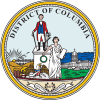Initiatives and referendums in the District of Columbia
Politics of District of Columbia |
|---|
 |
|
|
|
There is a defined process for initiatives and referendums in the District of Columbia. The process is laid out in the D.C. Code.[1] If an initiative receives enough signatures, is put on the ballot, and is approved by voters, it then must go through a 30-day review by the United States Congress.
The D.C. Council also has the power to reverse voter-approved initiatives, as it did in 2001 regarding term limits[2] and in 2019 regarding the tipped minimum wage.
Voter-approved initiatives include Initiative 59 (legalization of medical marijuana), Initiative 71 (legalization of recreational marijuana), and Initiative 77 (abolition of the separate tipped minimum wage).
Many initiatives do not end up on the ballot.[3][4]
References[]
- ^ "DC Code - § 1–1001.16. Initiative and referendum process". code.dccouncil.us.
- ^ Chan, Sewell (October 2008). "When a City Council Repealed Term Limits".
- ^ "You've Heard Of Initiatives 71 and 77. What Happened To 72-76?". Archived from the original on 2018-07-24. Retrieved 2018-07-17.
- ^ https://www.dcboe.org/getattachment/About-Us/About-Us/Initiative-Measures/Master-List-of-Initiatives-and-Initiative-Measures-7-10-2018-(1).pdf.aspx?lang=en-US
Categories:
- Politics of Washington, D.C.
- Washington, D.C. stubs
